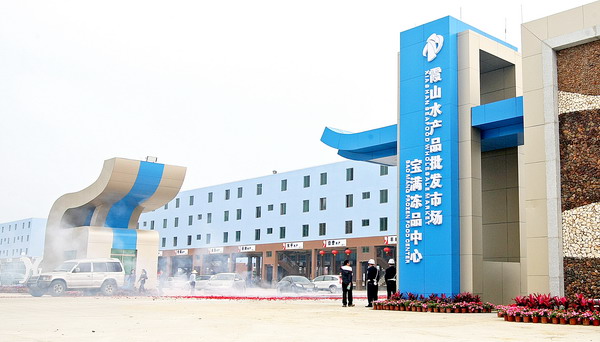After starting out as a crab dealer 17 years ago, Long Tujin has become a heavyweight in the world's prawn market, accounting for two-thirds of China's and one-third of the world's prawn produce, as Zheng Yangpeng reports from Zhanjiang in Guangdong province.
Long Tujin is in an industry that the market economy has not usually taken seriously.
For one thing, it's main product - the humble prawn - is, as it were, too small.
|
 Long Tujin's Xiashan Seafood Wholesale Market is the largest prawn trading market in Asia and provides 40 percent of the whiteleg shrimps sold in the United States. [Photo/China Daily] |
Nor has any government agency been able to properly regulate the market, making it notoriously complicated.
But the global operation that Long has created and now controls shows just what a massive earner prawns can be, and how efficiently the industry can be run.
Long's Xiashan Seafood Wholesale Market is the largest prawn trading market in Asia and provides 40 percent of the whiteleg shrimps sold in the United States.
It currently accounts for two-thirds of China's and one-third of the world's prawn produce.
Similar to how market conditions in the Netherlands determine the price of tulips and in Japan the price of tuna, Long's Xiashan Seafood Market is the most accurate weather vane for the global price of prawns, experts suggest.
So how could this one man, whose surname means "dragon" in Chinese, manage to make himself, as it were, the dragon of the prawn market?
His answer's simple: He says that since he set up his company, Zhanjiang Zhongxin Co Ltd, the one main thing he has done is "remove the obstacles to a free market".
It was in the early 1990s that Long - working as a mid-level manager at a local construction company after failing to make any real money as a crab dealer - turned his attention to the prawn market, then a growing, but poorly regulated, business.
At the time, Long remembers, it was a market being run without "rule of law, nor rule of man".
Prawn dealers would spare no effort to con farmers, forcing them to lower their selling prices to unbearable levels by telling them there was an oversupply in the market, and that their prawns weren't selling.
The dealers, in turn, would tell the buyers - many of whom had surprisingly little knowledge of the market - that prawns were in short supply, marking them up to unreasonable highs.
Dealers at that time made money "just by taking advantage of information asymmetry - that was their business model", says Long, the 49-year-old farmer-turned-entrepreneur, whose family was too poor to send him to college after he finished high school.
It was a corrupt market and far from free, he says.
"When the interests of both sellers or buyers are hurt, by either inflated or deflated prices, trade volume is the victim.
"Everyone will go looking for reasonable prices elsewhere, or just quit the business."
Someone had to stand up and redress the situation, and Long took it on, launching his own market.
